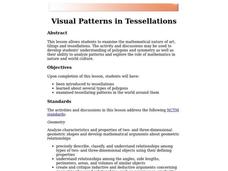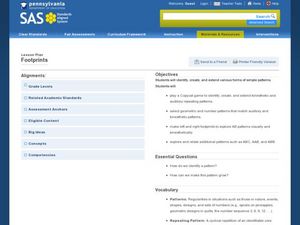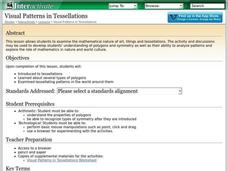Curated OER
Math in Nature
Students explore math in nature. In this instructional activity on the Fibonacci sequence, students use natural objects and Fibonacci numbers to discover mathematical patterns.
Curated OER
Pattern Detectives
Students discover patterns in language, math and science. They experience patterns by hearing stories, and becoming pattern detectives.
Curated OER
Visual Patterns in Tessellations
Learners explore tessellations as well as various types of polygon. Students examine tessellating patterns in the world around them. Learners examine tessellations by creating their own tessellations and completing the included worksheet.
Curated OER
Visual and Number Patterns
Fourth graders develop strategies for identifying geometric and number patterns. In this mathematical patterns lesson, 4th graders use pattern blocks to make repeating patterns with numbers and shapes. Students then explore number...
Curated OER
Number Sequences
Number sequences make for great challenges that stimulate pattern recognition, algebraic reasoning, and number sense. This slide-show includes eleven number sequences for learners to work through, an explanation of what number sequences...
John Lentine
Butterflies and Bugs
Symmetry, line, shape, art, and math are all connected through a fun hands-on craft. Included are instructions to a classic activity, where learners create butterflies to show symmetry in nature and then discuss symmetry in math. It is...
Curated OER
There's Gold in Them Thar Ratios
Students draw a model of the bunny problem which generates the Fibonacci Sequence, spirals generated from golden rectangles and golden triangles; identify the golden ratio in the human body, and find the Fibonacci numbers in nature.
Curated OER
How using number patterns help us add or subtract
Second graders use a number line to understand multiples. In this number line lesson, 2nd graders use a floor size number line and calculate problems with multiples. Students complete a worksheet with multiples.
Illustrative Mathematics
Complex number patterns
Start off with the definition of the imaginary number i, then have your class practice simplifying expressions involving powers of i and look for patterns. See how the cyclic nature of powers of i translate to sums of powers of i.
Curated OER
Middle-East Reflections
Practice symmetry and patterns with this Mid-Eastern art project. Your class will create beautiful, reflective mosaics that will brighten up the classroom! A list of necessary materials is included.
Curated OER
Causal Patterns in Density Phenomena
Young scholars investigate the relationship between volume and mass in different liquids such as vegetable oil, rubbing alcohol and water. They measure the mass of several different volumes of each liquid and then graph the results as...
Curated OER
Spiral Patterns in Art
In this art worksheet, students view a picture of Alexander Calder's sculpture "Black, White, and Ten Red." They analyze the sculpture by first finding the "rule" in the Fibonacci sequence. Students read a paragraph about where the...
University of Colorado
Are All Asteroids' Surfaces the Same Age?
Did you know scientists can tell the age of an asteroid by looking closely at its craters? This final instructional activity of a six-part series focuses on two asteroids, Gaspra and Ida, in order to demonstrate the concept of dating...
Curated OER
Fabulous Fractals
Students view a video to discover how patterns in nature relate to math. They explore the concept of exponential growth by observing and creating fractals. They solve and design word problems.
Curated OER
The Fibonacci Sequence
Students investigate a numerical pattern and look for evidence of mathematical patterns in nature. They solve puzzles and work with a partner to predict sequential numbers in a series.
Curated OER
Footprints
Students explore patterns. In this patterns geometry lesson, students identify and extend patterns including body parts, movement, geometric shapes, noises, and footprints. Students create and share an original pattern.
Curated OER
Numbers in Nature
Students identify numbers in nature. For this algebra lesson, students solve problems using Fibonacci sequence as it is expressed in nature. They research the Fibonacci's pattern as it relates to numbers.
Cabrillo College
Elementary Algebra
Hello Algebra! If you're in need of a resource with a books worth of examples and practice problems, this is it. Some topics include linear equations, polynomials and exponents, rational expressions, quadratic equations, and a great...
Curated OER
Representing and Extending Patterns
Learners explore repeating and growing patterns. In this patterns lesson, students describe patterns, explore changing patterns and match patterns. Learners participate in online activities and read books that show patterns in nature and...
Curated OER
Math and Music: Fibonacci Sequence
Students investigate the mathematical patterns of the Fibonacci Sequence. They determine how math is connected to music, specifically looking at music the uses the pattern sequence found in the Fibonacci Sequence.
Shodor Education Foundation
Visual Patterns in Tessellations
Geometers explore the concept of tessellations. They use a tessellation applet to manipulate shapes and design their own tessellation using the applet.
Education Development Center
Integer Combinations—Postage Stamps Problem (MS Version)
Number patterns can seem mysterious. Help your learners unravel these mysteries as they complete an intriguing task. Through examination, collaborative groups determine that they are able to produce all integers above a certain value by...
Curated OER
Fractals Teachers' Notes
When you see a flower or a tree in nature do you see the math? This web resource contains many ideas for using fractals in a math class including Sierpinski’s triangle, Koch's Snowflake, and the Jurassic Park Fractal. Additionally, it...
Curated OER
Science and Math Lab (Students Look at Symmetry in Nature)
Students study patterns. In this symmetry in nature lesson, students examine objects to determine what type of symmetry they have. They work in small groups to rotate through stations that have objects for them to study.

























